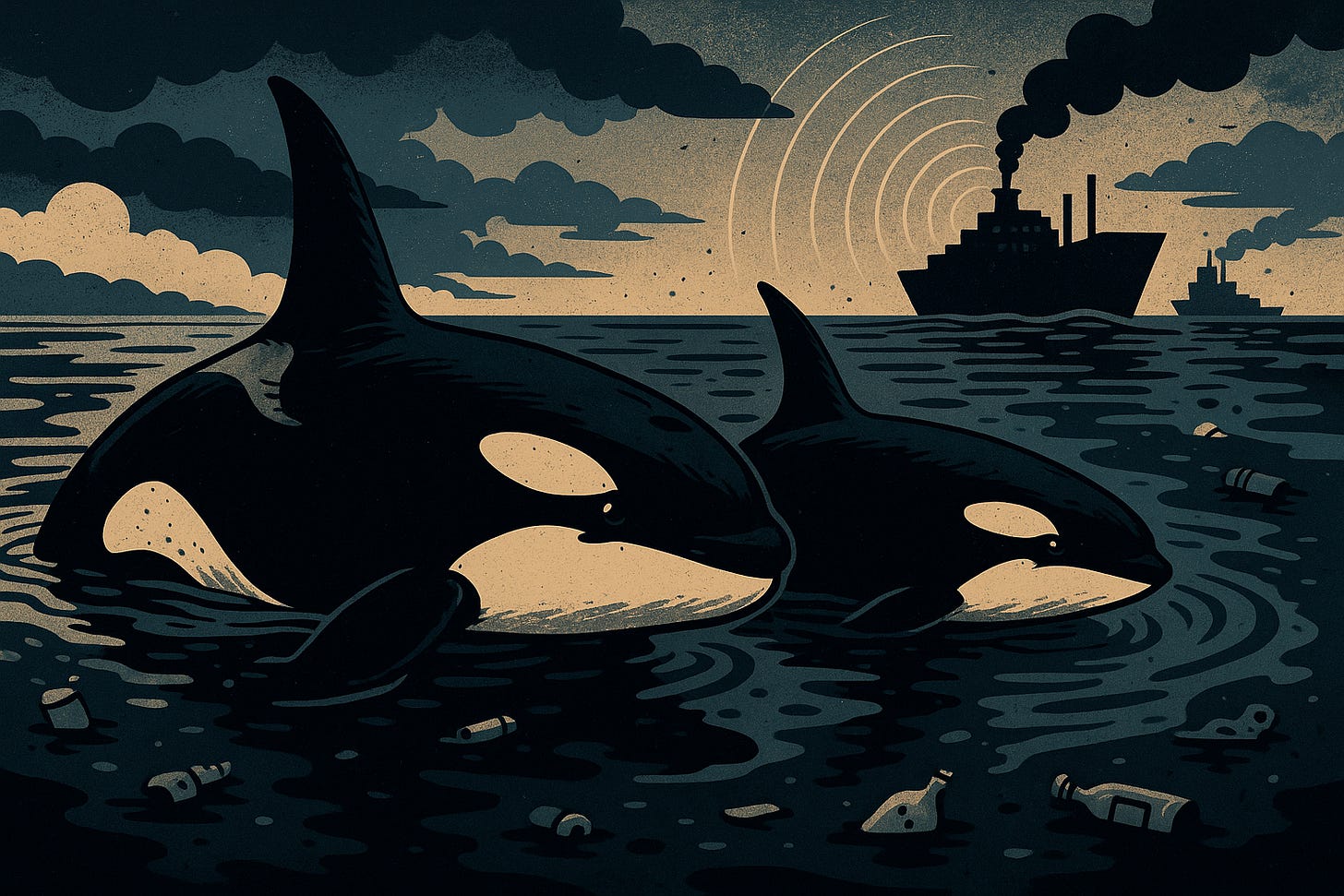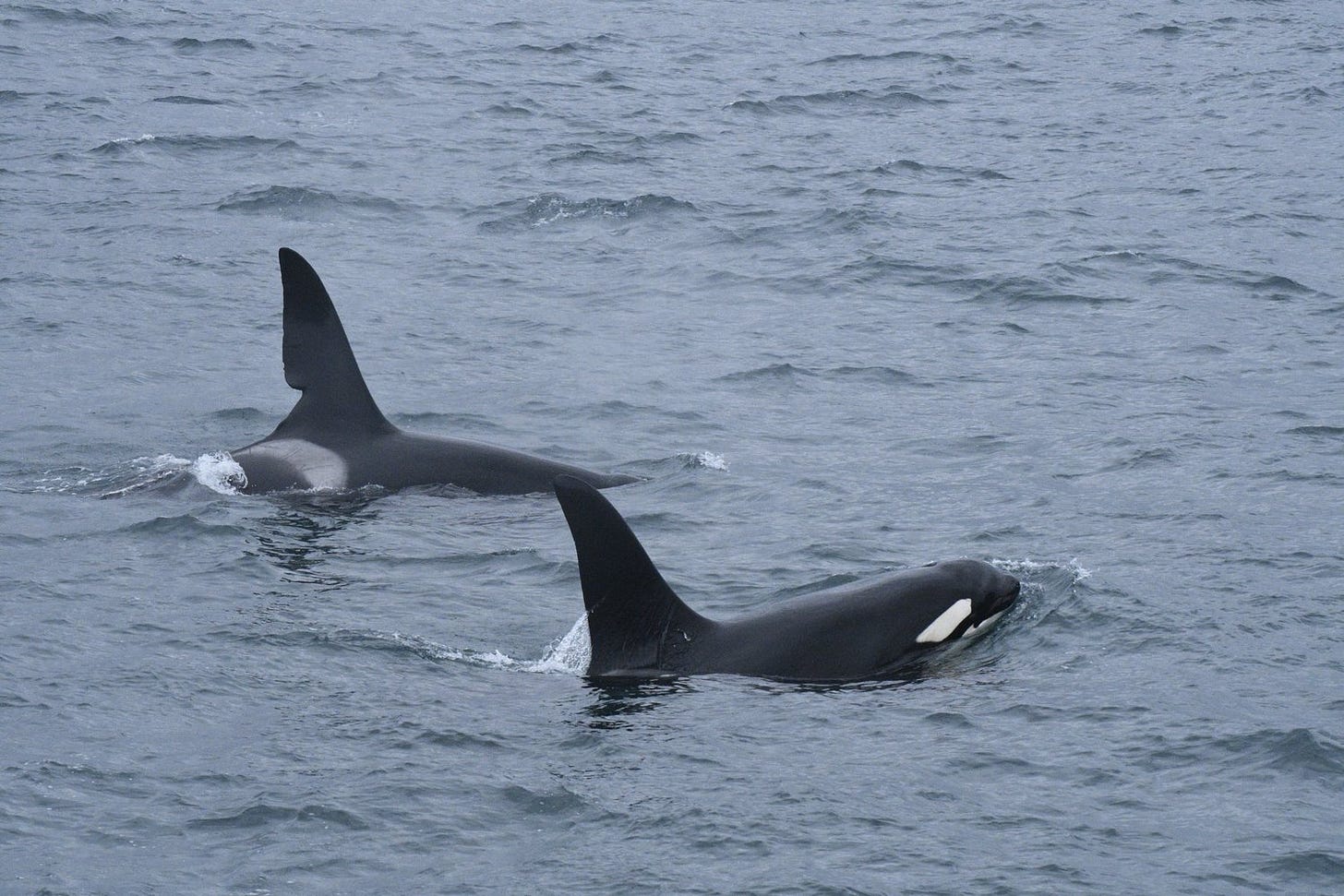Britain’s Last Resident Orcas Are Near Extinction
The last two still call to each other in a language only they understand.
We call them “protected waters.”
Yet deep in these so-called protected zones, Britain’s last two resident orcas are trapped in a toxic, noisy nightmare.
They are John Coe and Aquarius.
They are the evidence.
Imagine watching the last two members of a close-knit family disappear, not suddenly, but slowly, over years of preventable harm. That’s John Coe and Aquarius, stuck in waters meant to keep them safe. Their fate is shared by whales and dolphins worldwide, all pushed to the brink. Their slow disappearance is a wake-up call, proof that policies meant to protect them are failing.
On a cold May morning off Scotland’s coast, two killer whales glide through the grey sea. One’s dorsal fin is torn, a mark locals know well, John Coe. The other, Aquarius, is quieter, harder to spot.
John Coe and Aquarius are the last resident British orcas. Their numbers have dwindled so far that soon, we may never hear their calls again.
These orcas inherited distinct dialects, complex vocal traditions passed down through generations in their West Coast Community. When these calls fall silent, entire cultures vanish beneath the waves.
In 2021, researchers aboard the Hebridean Whale and Dolphin Trust’s vessel captured a rare recording of their calls. That haunting sound now rests in the British Library, alongside the voices of extinct birds and fading human languages.
This might be the last chance we have to hear the voices of Britain’s orcas…
Genetically Isolated. Culturally Distinct. Doomed.
Much of what we know comes from scientist Dr Andy Foote. He discovered that the West Coast Community is not only genetically isolated, but physically distinct, with larger bodies, distinctive sloped eye patches and teeth worn down from tackling seals, porpoises, even minke whales.
They don’t interbreed with other orcas. No calves have been born in over two decades. This isn’t just a decline, it’s the collapse of both reproduction and tradition. When no young remain to inherit a way of life, extinction becomes inevitable.
In 2016, the last known female, Lulu, washed up on the Isle of Tiree. She had never reproduced. Her body contained 950 mg/kg of PCBs (toxic industrial chemicals banned decades ago but still lingering in our seas), over 100 times the threshold known to cause harm.

Poisoned, Isolated, Drowned Out
Imagine a thriving orca community, where pods roam freely through crystal-clear waters, their complex songs filling the ocean with vibrant life. Mothers teach their calves to hunt, to communicate, to belong. Their calls ripple across the sea, a living heritage passed from generation to generation.
Now compare that to John Coe and Aquarius, drifting through toxic waters thick with poisons, their songs fading into silence.
Their fate is not just biology, it’s policy, regulation, and human choice.
Functionally extinct, John Coe and Aquarius endure deafening ship noise that drowns out their calls and disrupts hunting, lingering chemical poisons that weaken their immune systems and block reproduction, genetic isolation that causes inbreeding, and relentless seismic blasts that disorient and drive them from vital feeding grounds.
All within the marine protected areas we claim to safeguard.
There is no coming back from this. No new calves will ever carry this unique culture forward. What we watch disappear is not just two whales, but an entire living lineage, lost forever.
Extinction, by Design
In the UK, we like to think we protect our seas. Ministers make speeches. Maps of protected areas are drawn up. Nature documentaries win prizes.
However, beneath all the talk, Britain’s last orcas are disappearing.
This isn’t some distant problem.
It’s happening right here, on our doorstep.
In waters labelled as “protected,” licensed companies blast the seabed with airguns every 10 seconds for weeks on end. The noise is deafening, louder than a jet engine, shattering the orcas’ ability to talk, hunt, and live.
Meanwhile, Defra drags its feet while known pollution hotspots, like the Clyde, remain poisoned by the same PCBs that weakened Lulu’s immune system and made her infertile. The government pledged to eliminate these by 2025 under the Stockholm Convention on Persistent Organic Pollutants, yet progress is slow and behind schedule.
The North Sea Transition Authority rubber-stamps seismic permits without real safeguards. The Joint Nature Conservation Committee issues guidelines meant to protect marine life, but enforcement is patchy or non-existent.
Industry pushes forward, blasting away, tearing apart the fragile world the orcas depend on.
Ministers boast about marine protection, but when it comes to real action, they step back.
John Coe and Aquarius swim on.
Not Just Here. Not Just Them.
What’s happening in Britain is not unique. Around the world, cetaceans are disappearing, not from a single threat, but from many, layered and relentless.
Whales are still tangled in nets, poisoned by chemicals, struck by ships, deafened by sonar, and left starving in acidifying seas.
Krill are vanishing. Migrations are shifting or stopping. Ancient rhythms unravel as oceans warm and polar habitats melt.
The extinction of a single orca group off Britain’s coast might seem like a local story. It isn’t. It’s a warning. A mirror. A signal of what’s at stake across the world.
What You Can Actually Do
We can stop the story of John Coe, Aquarius and Lulu being repeated.
Track the Last UK Orcas
If you spot whales or dolphins in UK waters, report them through Whale Track. Your sightings help scientists monitor these fragile populations, including John Coe and Aquarius, and build the evidence needed to push for stronger protections.
Support a Quieter, Cleaner Ocean
Whale and Dolphin Conservation runs targeted campaigns against ocean pollution and underwater noise. Add your voice or learn more here: Create Healthy Seas – WDC
Push for a Toxin-Free Ocean
PCBs were banned decades ago, but still contaminate our seas, silencing entire lineages before they’re born. Lulu’s story shows what’s at stake. We need tougher laws, real cleanup, and urgent political will. Write to your MP. Share the science. Support a chemical-free future. The next killer whale calf shouldn't be poisoned before it's even conceived.
Share Their Story
Most people don’t even know the UK has orcas, let alone that we’re losing them. Let John Coe and Aquarius be more than archived voices. Share their story.
Rare footage of John Coe and Aquarius, filmed May 2025 north of Rathlin Island by the Irish Whale and Dolphin Group.
When Silence Becomes Our Legacy
We record the voices of dying languages, desperate to preserve what slips away forever.
Here, in the waters we claim to protect, two orcas still call to each other, a language no one else will ever hear again.
Their story is nearly over.
No more calves will carry their legacy. No more songs will echo through these seas.
This is not just loss. It is a brutal failure, a violent betrayal by our laws, our governments and our apathy.
If this story stayed with you, send it to someone who’s forgotten the ocean. Let John Coe and Aquarius echo beyond the page.
You can also subscribe to Ocean Rising for weekly dispatches from the deep.
– Luke
PS: If this shook you, don’t let it stop here. Like, share, and restack. Help the story find the people who need to hear it.





A terrible indictment on human indifference. Only when money stops being the overriding priority will any sense enter the equation.